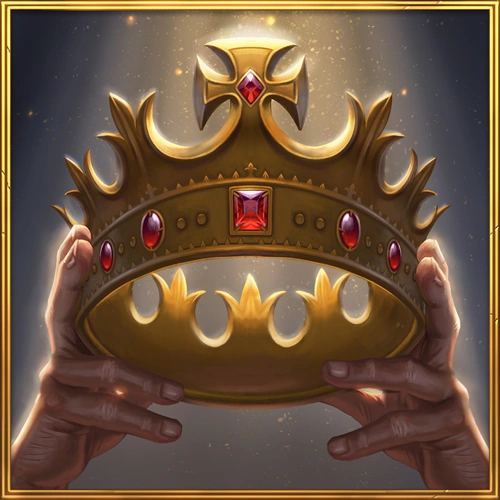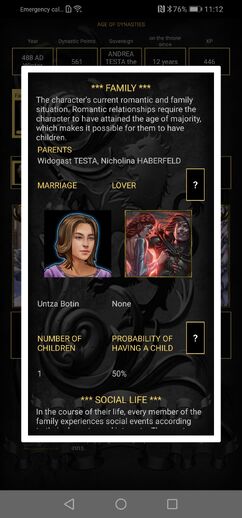Introduction[]
Managing the family tree in the best possible way is of fundamental importance to be able to have a long-lived and loyal dynasty. The descendants of your family are not only the future rulers of your kingdom but also valuable allies. In this short guide we will try to explain how to best manage everything.

The family tree can be accessed among the available actions before concluding a game round. As soon as the family tree is accessed, the list "Line of succession" is proposed by default but you can change view and select also "Family tree" and "The kings timeline".
Information available[]
There are three different lists you can use to analyze your family's information.
Linea of succession[]
This view shows the relatives who can participate in the succession to the throne starting from the legitimate successor to the throne up to the farthest one. By touching a character's card, you can change the name and image. You can educate your heirs to improve the likelihood that when they sit on the throne they will have positive traits.
Family Tree[]
This view shows all family members including marriages and any lovers. By touching a character's card, you can change the name and image. In the case of a marriage or lover, the surname can also be changed.
The Kings timeline[]
The timeline of the rulers shows in chronological order all the rulers who have succeeded each other on the throne. The period in which they reigned and the reason for their death is also indicated.
Family customization[]
When you start a new game, deceased parents are spawned for the current ruler and some family members. You can customize the names and appearance of these family members by accessing the family tree. Thereafter the arrival of new family members is handled with your choices.
Choice of a new family member[]
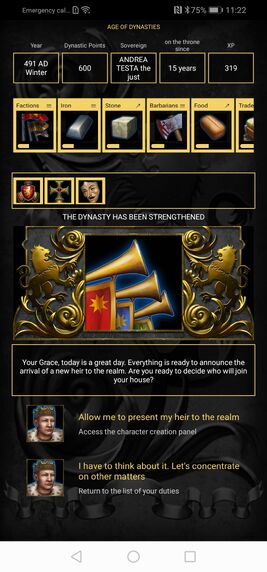
The arrival of a new descendant in the family is handled with a special event entitled "New Heir". The frequency with which this event occurs depends on the dynastic points available to you and the number of family members. The larger the reserve of dynastic points at your disposal, the larger your family will be. When the "New Heir" event happens you are redirected to a page where you can choose who will be the new member of your family.
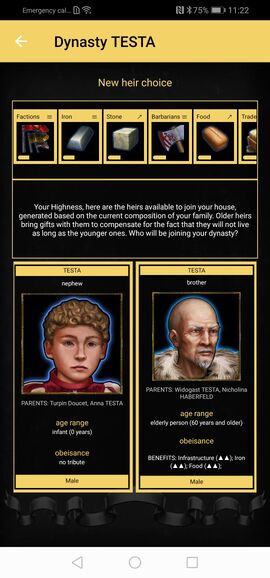
When you access the panel for creating a new family member, the choices available depend on the current composition of the family and the romantic relationships that have been created in the meantime.
Not only will you have the ability to choose new born, you can also choose to introduce older or older family members to the kingdom if you wish. To remedy the fact that these family members will live shorter than the new born, these descendants bring with them gifts for your kingdom. In situations of crisis in the kingdom, using the wealth of these relatives can be very convenient.
The degrees of relationship available are as follows: ancestor, great grandfather, great grandmother, great aunt, great uncle, grandfather, grandmother, father, mother, aunt, uncle, brother, sister, half-sister, half-brother, daughter, son, illegitimate child, cousin, nephew, niece, grandson, great grandson.
How can a family member have a child?[]
In order to be able to choose a child of a particular relative or ruler, the character must be in a relationship.
There are two types of relationships: marriages and lovers.
Each family member can be married and take a lover. Both of these romantic relationships increase the probability that the family member will have a child. Marriage will always require the approval of the sovereign, while a relationship with a lover can happen regardless of the whether the sovereign gives their approval or not. A royal wedding can be arranged with a member of one of the opposing factions to improve your relationship with them and increase your cultural influence in their region, or it can be arranged between the houses of your own realm to resolve any emergencies. It will be up to you to arrange and plan the weddings of your heirs to your best advantage. Sometimes an heir may ask for your permission to marry a lover or get a divorce. Whether you approve this decision or not, it will have repercussions on the loyalty of the family member, as well as possibly forcing them to marry someone they do not want.
When a character reaches the age of majority, they can enter into romantic relationships. Celebrating a wedding creates a 50% chance that the character will have a child. A relationship with a lover increase the probability of them having a child by 40%. When a character is over 50 years old, the odds are halved. The likelihood of the sovereign having children increased by 30%.
Relative panel[]
By touching the card of a relative you will have access to all the information concerning him/her in a panel.
Information about the relative is divided into four parts:
- basic and personal characteristics
- skills, family heirlooms and noble title
- family, relationships and children
- social events
Basic and personal characteristics[]
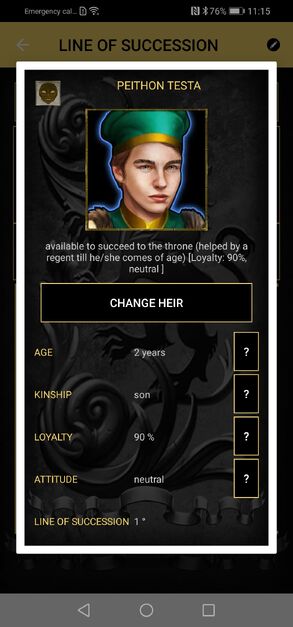
In the upper part it is possible to view the personal information, the loyalty of the relative towards the dynasty, the attitude of the relative towards the current sovereign, his/her right to access the throne and the percentage that has positive traits if he/she were chosen to become the new sovereign.
- AGE: age is a factor to consider before investing in training. Your investment could be lost if the person dies shortly after his appointment.
- KINSHIP: The degree of kinship indicates the type of relation that connects the heir to the current monarch.
- LOYALTY: each heir has a percentage of loyalty to the dynasty, which determines the probability that they will decide to act for the good of the dynasty rather than in their own personal interest. The higher the percentage, the more the heir will do their best not to harm the dynasty. Depending on some choices you make in some events, this percentage may change.
- ATTITTUDE: during their life, each member of your house develops an attitude towards the current sovereign. The attitude that the family member has towards the sovereign can be modified depending on some choices that you can make during certain events. Indulging the will of an heir, in addition to improving the character's opinion of the sovereign, also increases their loyalty to the entire dynasty. Beware of family members who will have a low loyalty percentage and a hostile attitude, as they may try to hatch a plot to assassinate the reigning sovereign. In addition to having an opinion of the sovereign, each heir also develops an opinion on the other members of the family during the social events that take place during their life. To see how the relationships with other family members are progressing, click the social events button below.
- LINE OF SUCCESSION: the order in which the relative has the right to sit on the throne with respect to other descendants
- % GOOD TRAITS: this percentage indicates how likely the heir will have positive traits if he/she is chosen as the next ruler. The likelihood that a heir will have good character traits depends on a number of factors, such as: education, personality, types of talents used and the year in the game. You can improve a heir's education and increase the possibility that his/her coronation will have good traits by pressing the button (+).
Skills, family heirlooms and noble title[]
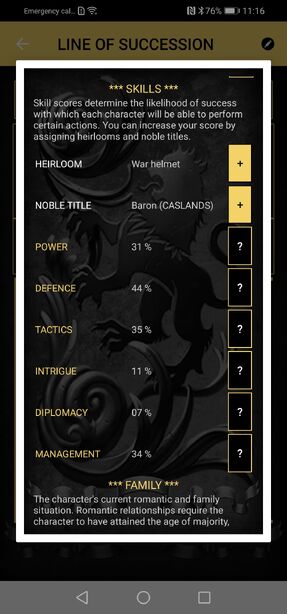
Skill scores determine the likelihood of success with which each character will be able to perform certain actions. You can increase your score by assigning heirlooms and noble titles.
- HEIRLOOM: heirlooms are exclusive artefacts that can be assigned to your heirs to level up their skills. Each heir can possess a single heirloom.
- NOBLE TITLE: noble titles can be assigned to your heirs to improve their abilities and to get them involved in the management of the realm.
- POWER: the degree of authority they have determines the character's standing in political events and their ability to counter hostile political actions against them.
- DEFENCE: this skill measures the character's ability to survive fights that could put their life at risk.
- TACTICS: this skill measures the character's ability to implement effective tactics to achieve their goals.
- INTRIGUE: this skill measures the character's ability to juggle political plots and intrigues as well as to find out who, if anyone, is plotting against them.
- DIPLOMACY: this skill measures the character's ability to handle sensitive affairs prudently, including their person-to-person relationships.
- MANAGEMENT: this skill measures the character's ability to manage the resources entrusted to them and to make the right decisions to achieve their objectives.
Family, relationships and childrens[]
This box shows the current relationship status of the relative. Marriage, lover and children.

Weddings[]
Weddings of relatives can be organized into events that will happen automatically. In these events you will have the possibility to choose what kind of wedding to organize. There will be three types of choices:
- a marriage suitable for the good of the kingdom at the expense of what your relative wants (his attitude towards the sovereign will worsen)
- a marriage that will make the relative happy at the expense of the good of the kingdom (often the choice will not be convenient for the indicators of the kingdom)
- a marriage to be proposed to a faction of the game (the relative will not be enthusiastic about it but you will have the possibility to increase the cultural influence in all the cities of the faction if he agrees to unite your houses in a marriage)
Which marriage to propose depends on the situation in the kingdom, the relative's current attitude and loyalty, and your game goals.
Relations with lovers[]
Unlike weddings where you can choose who to marry your relative or the sovereign, relationships with lovers can only be approved or rejected. Some relationships can generate a scandal such as incest or adultery, you can terminate these relationships by making the relative angry.
Relationships with lovers can end on the decision of the relative at any time.
Social events[]
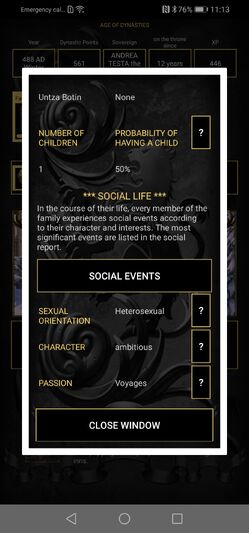
Over time, your family members will participate in some social events that will change their relationship with other family members. Some may become very affectionate, others may even go so far as to hate each other and, in the worst case, try to kill themselves. These events are not predictable.
By pressing the "social events" button it is possible to view the current attitude of the relative towards the family and the current sovereign based on the events that have arisen in recent years and the decisions taken by the sovereign.
Social events are also influenced by your relative's character, passions, and sexual orientation. Character, passion and sexual orientation are randomly generated. The only thing that can be changed is sexual orientation.
[]
The character and passion generate events in which you can decide whether to approve certain things that will lead the relative to improve or worsen his attitude towards the current ruler and his loyalty to the dynasty.
Personalization of the relative[]
Using the edit heir button it is possible to change the name, image and sexual orientation of the relative. In the family tree it is also possible to change the surname of the partners.
Political events[]
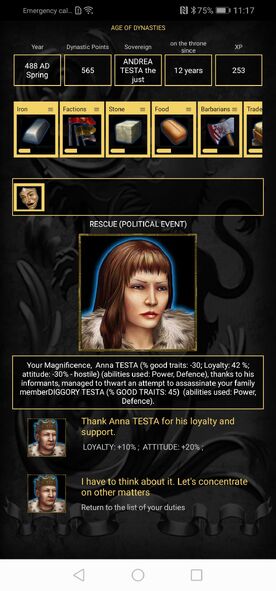

In addition to social and relational events, relatives will also be involved in the political life of the kingdom. Based on their loyalty to the dynasty, their attitude towards the sovereign and their power (a skill that can be increased with noble titles and family heirlooms) the relatives will actively participate in the management of the kingdom. If they are loyal and friendly they will do anything to help the sovereign otherwise they will try to depose the sovereign and cause problems. These interventions will take place through political events.
In addition, relatives who will receive a noble title, based on their loyalty and attitude towards the sovereign will be able to help or hinder the sovereign in events that require more choices to be resolved. Their intervention may bring additional benefits or additional costs if their proposal is chosen.
Interventions of the sovereign[]
Some political interventions of relatives will rely on their abilities but may be thwarted by the abilities of the ruler. If the sovereign manages to neutralize some negative interventions by some relatives there will be an event that will inform what happened.
Customize line of succession rules[]
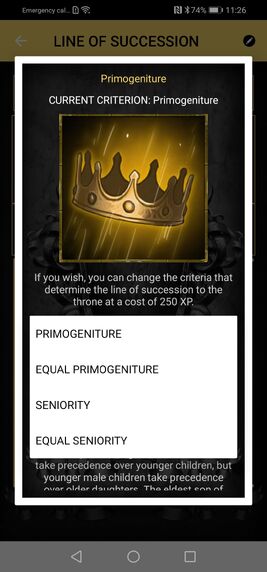
In the family tree it is possible to modify the rules by which the line of succession occurs. To do this, simply click on the pencil icon ✎ in the top bar.
- PRIMOGENITURE: Primogeniture (or, more accurately, male primogeniture) is a mechanism whereby the sovereign's male heirs take precedence over female heirs and the elder line of descent always takes precedence over the younger line, irrespective of gender. Older children take precedence over younger children, but younger male children take precedence over older daughters. The eldest son of the reigning sovereign is first in the line of succession.
- EQUAL PRIMOGENITURE: Equal primogeniture, or absolute primogeniture, is a form of succession by which the eldest child of the sovereign succeeds to the throne, regardless of their gender, and in which females (and their heirs) enjoy the same right of succession as males.
- SENIOTIRY: In the lines of succession based on seniority, the monarch is almost always succeeded by their brother, or by cousins if the royal house is larger, and so on, in order of seniority.
- EQUAL SENIORITY: In the lines of succession based on seniority, the monarch is almost always succeeded by their brother or sister, or by cousins if the royal house is larger, and so on, in order of seniority.
Tips[]
- seeks to improve the education level of all relatives who have a good personality by giving priority to those who are young. Investing experience points to improve the education of senior rulers could be risky as they could die at any moment.
- assigns noble titles and family heirlooms to all relatives you intend to invest time and resources in to help you manage the kingdom. Once titles and heirlooms have been assigned, try to satisfy their request to keep their level of loyalty high and their attitude towards the sovereign positive.
- some relatives will be born in a bad light and have a very bad chance of having positive traits which does not mean that you cannot use them to carry out jobs for officials such as spies, generals, ambassadors or others.
- if the successor to the throne has a too low probability of having positive traits, consider making him/her die at the first favorable opportunity.
